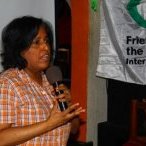
6 December 2012 | Interviews | COP 18 on Climate Change | Climate Justice and Energy
Lack of Ambition at UN Climate Talks
Civil Society Puts Pressure on World Leaders to Avoid New Failure at Climate Talks
Download: MP3 (5.4 Mb)
As scientists are increasingly warning about the catastrophic effects of a six-degree C temperature rise unless immediate action is taken to stop climate change, the world leaders who met in Doha, Qatar at the United Nations Climate Conference (COP 18) are showing very little ambition to tackle the climate crisis.
Real World Radio interviewed Meena Raman, of SAM - Friends of the Earth Malaysia, who is currently in Doha, to learn about the main expectations of civil society groups and their assessment of the negotiations.
Meena said the talks are in a critical and dangerous stage because of the lack of concrete action. Civil society groups are experiencing a lot of frustration because developed countries are not achieving progress in areas like the Kyoto Protocol track and the Green Climate Fund.
The Kyoto Protocol is a legally binding agreement signed in 1997 at the United Nations Conference on Climate Change held in that city in Japan. Under the Protocol industrialized countries agreed to reduce their collective emissions of greenhouse gases by 5.2% compared to the 1990 levels. This COP will decide whether the countries will commit to a second commitment period, due to start in early 2013 and to be in force until 2017, or if they will let the Protocol die.
About the green climate fund, Meena said that despite their promises, so far developed countries have put no money in the fund, which is important to help developing countries adapt to the effects of climate change, such as drought, floods and extreme climate events. It is also important to mitigate climate change in developing countries, i.e. to reduce their own levels of greenhouse gas emissions.
The Friends of the Earth activist said developed countries are also locking the international mechanism on loss and damage, a promise made two years ago at the COP 16 in Cancun. This mechanism would help small islands or very poor African countries that find it really hard to recover from extreme climate events.
Finally, Meena said the civil society is putting pressure on the ministers of developing countries in Doha to avoid a weak outcome from the talks. She urged the civil society to do the same in their capital cities: to put pressure on the presidents and ministers so they see that civil society is active and so that leaders don’t cave in to the pressure of developed countries.
Photo: foei.org







